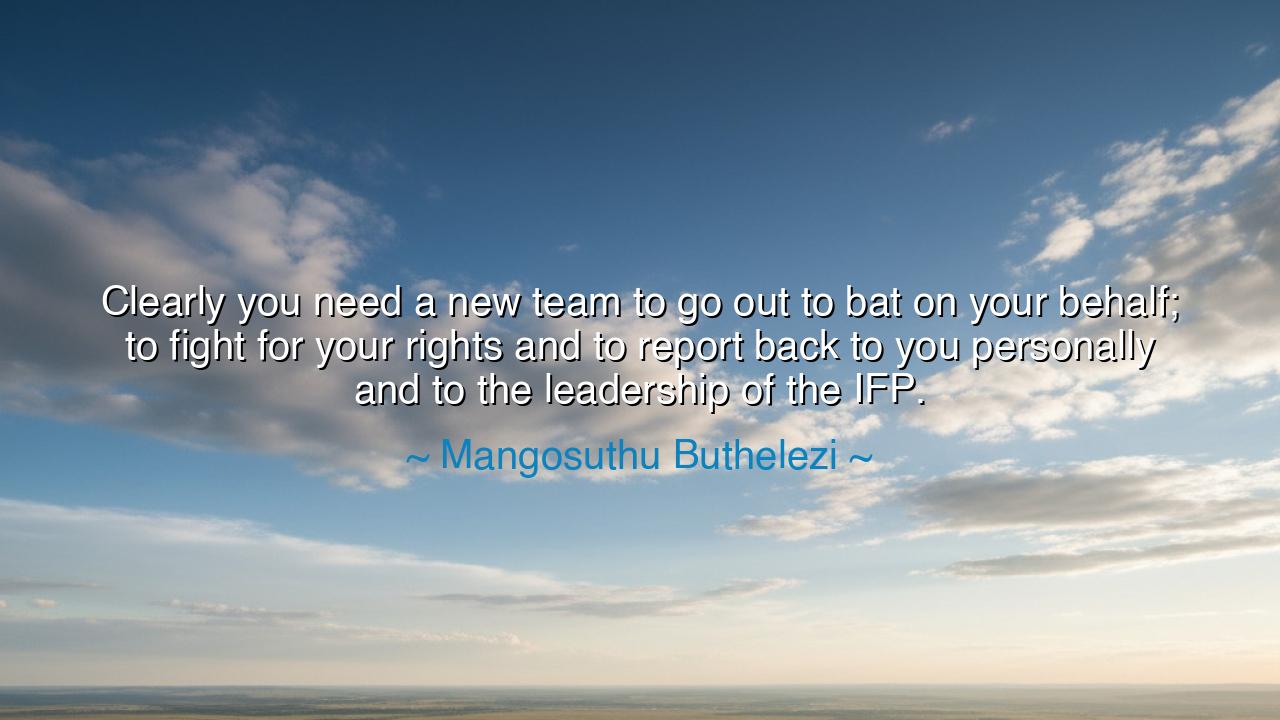
Clearly you need a new team to go out to bat on your behalf; to
Clearly you need a new team to go out to bat on your behalf; to fight for your rights and to report back to you personally and to the leadership of the IFP.






The words of Mangosuthu Buthelezi — “Clearly you need a new team to go out to bat on your behalf; to fight for your rights and to report back to you personally and to the leadership of the IFP” — echo with the clarity of a leader who understood both the burden and the rhythm of representation. Spoken during the turbulent years of South Africa’s political transformation, they are not merely words of strategy, but of renewal — a call for strength, vigilance, and faith in the collective. Buthelezi, founder of the Inkatha Freedom Party (IFP), spoke as one who had lived through the fires of struggle and seen that no revolution, no movement, no freedom can endure unless it is continually reborn through new hands, new voices, and new courage.
In the spirit of the ancients, this call to “a new team to go out to bat” recalls the passing of torches among warriors and sages — the understanding that leadership must never stagnate. A leader, no matter how wise, cannot fight every battle alone. The vitality of a cause depends upon those who rise after him, carrying forward its essence with renewed energy. Buthelezi’s words, therefore, are both pragmatic and prophetic. He reminds his people that to preserve their rights, they must build not a single pillar, but an army of steadfast ones — individuals willing to step into the field, to act, to defend, and to bring back the truth to those who trust them.
The imagery of “to go out to bat” carries within it the spirit of teamwork — a relay of effort, a shared burden. In the struggle for justice, no one hand strikes alone. There are scouts and messengers, fighters and thinkers, each playing their role in the larger design. Buthelezi’s command is not one of abandonment, but of delegation born from wisdom: the realization that leadership must be both distributed and accountable. To send forth a new team is to plant seeds of future strength; to demand that they report back is to ensure that these seeds grow under the sunlight of truth and unity.
We find a mirror of this wisdom in the story of Moses and Joshua. When Moses grew weary, it was Joshua who led the people into battle, standing as the extension of his leader’s faith and courage. Yet Joshua always returned to Moses, to learn, to report, to align the sword with the spirit. In the same way, Buthelezi’s words call for a new generation of Joshuas — men and women who would fight not for personal glory, but for the people’s cause, who would go forth in strength yet return in humility, binding leadership and the led into one unbroken circle.
For Buthelezi, whose political life was marked by both controversy and conviction, the idea of renewed leadership was more than a political necessity — it was a moral one. He understood that a movement’s survival depends not on the immortality of its founders, but on the continuity of its principles. The IFP, like all institutions of justice, could not depend forever on the charisma of one man. It required a system — a living body with many limbs and many hearts — each ready to act with courage and report with honesty. This is not simply politics; it is the discipline of governance, the same discipline that sustained ancient kingdoms and republics alike.
Buthelezi’s message also speaks to every field of human endeavor — whether in politics, art, or faith. There comes a moment when one must step aside to let others carry the cause forward, not as replacements, but as successors in a sacred lineage. The wise leader does not cling to command but ensures that those who follow understand both the mission and the responsibility. The act of sending forth others — to “go out to bat” — is itself an act of courage, for it demands trust. And trust is the highest form of leadership, higher even than command.
The lesson in Buthelezi’s words is thus timeless: leadership is not the possession of the few, but the inheritance of the many. If a cause is to endure, it must be renewed through action, communication, and shared responsibility. To “report back” is to remain accountable to truth; to “fight for rights” is to never let complacency take root. Each generation must form its own team, trained not only in skill but in spirit, united in loyalty and guided by integrity.
Therefore, let all who hear this teaching remember: every movement, every family, every dream needs its new team. The elder must teach, the younger must act, and both must remain bound by the thread of purpose. For a cause without renewal dies in silence; but one that trains its successors and keeps its leaders accountable will live as long as justice breathes. In this way, the fight for rights becomes not a passing battle, but an eternal covenant — and leadership, as Buthelezi reminds us, becomes a burden carried together, not by one, but by all.






AAdministratorAdministrator
Welcome, honored guests. Please leave a comment, we will respond soon